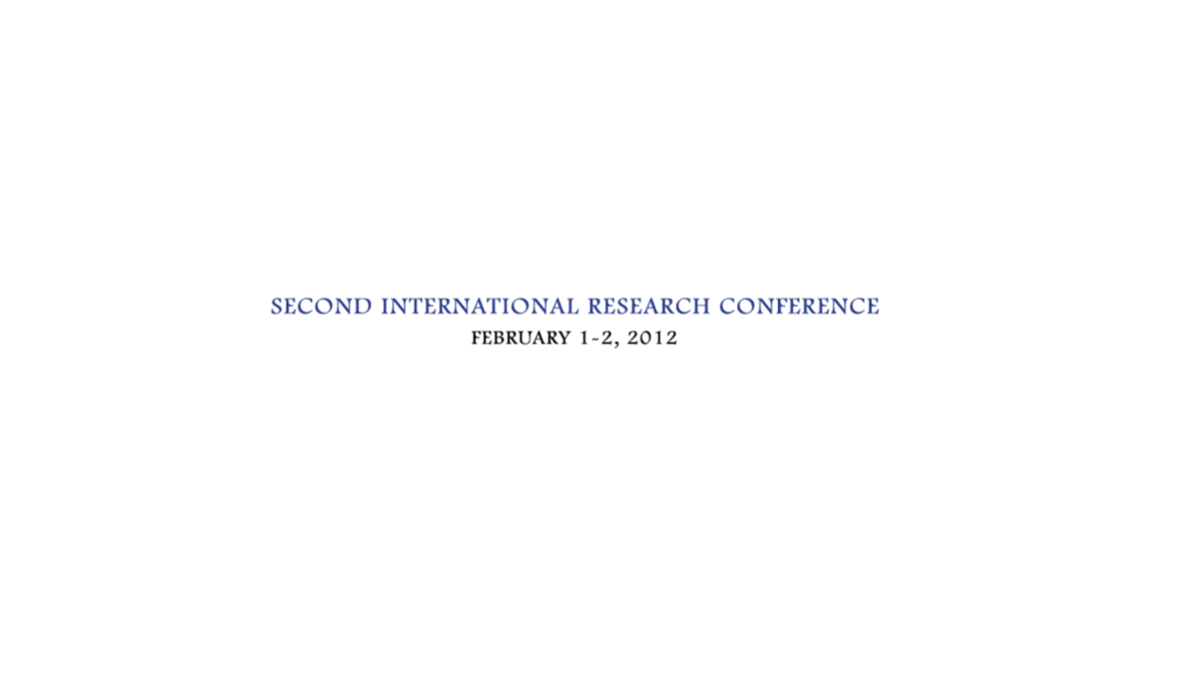Home - SIRC - Reserve Bank of India






About the Conference
SECOND INTERNATIONAL RESEARCH CONFERENCE
Monetary Policy, Sovereign Debt and Financial Stability: The New Trilemma
February 1-2, 2012
Context and Objective
The Reserve Bank of India organised the First International Research Conference (FIRC) in February 2010 on the occasion of its Platinum Jubilee Year along with a series of other knowledge-sharing events. These initiatives were aimed at making the Reserve Bank a more responsive, relevant, professional and effective public institution. To continue the knowledge-sharing events, it was decided that the International Research Conference would be held once in two years. Therefore, this Conference is the second in the series of the International Research Conferences.
The theme of the Second International Research Conference is ‘Monetary Policy, Sovereign Debt and Financial Stability: The New Trilemma’. Post-crisis, the unprecedented monetary policy easing and fiscal stimulus has resulted in sovereign debts getting bloated but supported by low interest rate regimes that artificially boost risk appetite and blur the financial stability issues. As monetary and fiscal authorities have started exiting the stimulus, interest rates could rise, resurrecting the history of sovereign debt and financial stability troubles. Tightening of monetary policies can magnify sovereign and bank balance sheet risks. This one-and-a-half day Conference discusses the challenges/dilemmas faced by central banks while conducting monetary policy under such circumstances.
The current economic situation is much more complicated than managing crisis. Central banks across the globe are in a dilemma on whether to accept explicit price stability or macro-financial stability as an objective. The public authorities learned from the crisis that only a co-ordinated approach can abate crisis. The conduct of monetary policy in the globalised world is also being affected by external developments, which significantly condition the growth and inflation outlook of national economies, besides posing risks to financial stability through contagion. Policies conducted by any systemically important country could spill over to others, thereby affecting the effectiveness of national policies. Quantitative easing policy of the US, fiscal indiscipline of several European countries, and the undervalued exchange rate policy pursued by some countries have been the prime examples in the recent period. National policies face the challenge of, first, assessing the nature and magnitude of spillover impact, and second, conducting policies that could effectively influence the ultimate policy objective. With the given complexities of the situation, greater co-operation and harmonisation is the need of the hour at the international level to deal with any further domino effect of such events. The Governors’ panel discussion during the Conference by veteran central bankers will address a set of issues that arises from these concerns, while also attempting to communicate on the issues relating to resolving the trilemma.
Lastly, there is a need to discuss whether it is possible for the central banks to be the sole authority to ensure price stability, overall economic growth and financial stability with multiple objectives and multiple instruments. Also, what would be the internationally acceptable financial architecture to prevent further crisis and what would be the exit strategy for the debt being created on account of the financial crisis.
Against this backdrop, the theme of the Conference, viz.,‘Monetary Policy, Sovereign Debt and Financial Stability: The New Trilemma’, is of contemporary relevance, which sketches a broad canvas of issues relevant to resolving the on-going crisis and redefining the role of global central banks. Also, especially from central banks’ perspective, the deliberations in this Conference would provide valuable inputs for policymaking.
About Department of Economic and Policy Research
Economics Department in Reserve Bank of India (RBI), established as an independent Department in 1959, was reorganised as Department of Economic Analysis and Policy (DEAP) in 1982 to provide a better focus on economic issues while maintaining a viable size. Further in September 2010, the Department was restructured in view of fast-changing economic environment domestically as well as globally and it was re-named as Department of Economic and Policy Research (DEPR). The primary function of the Department is to provide advice and assistance to the Bank on policy issues particularly related to the economic and financial developments in India and abroad. The Department has recently been awarded ISO 9001:2008 certification.
The Department undertakes policy-oriented economic research and is a primary source of data relating to monetary aggregates, balance of payments, household financial savings, state government finances and capital markets. It also prepares weekly economic and financial reports for the Committee of the Central Board and maintains an up-to-date management information system on macroeconomic and financial issues for the top management and other operational Departments of the Bank. This is accomplished through constant policy-oriented research activities covering, broadly, the entire spectrum of the financial system, besides the real sector.
The Department brings out seven major publications - four annual, viz., the Annual Report, Report on Trend and Progress of Banking in India, Report on Currency and Finance and Finances of State Governments; a monthly Bulletin along with its Weekly Statistical Supplement and Reserve Bank of India Occasional Papers - a tri-annual research journal - and Working Papers. It is interesting to note that the Department embarked on the publication of the Reserve Bank of India Bulletin a monthly economic and financial journal - in January 1947 - signifying that the Bank was well ahead of some of the contemporaries in this area. The Department brings out the document on Macroeconomic and Monetary Developments, which accompanies the Quarterly Monetary Policy Statement. Recently, the Department has started publishing a Working Paper series on its website with a plan to develop them into full-fledged research papers to be considered for publication in either the Occasional Papers or in external research journals. The analytical rigour, coverage and timeliness of these publications have established them as reference documents among the market participants, analysts, academics and the international community.
The initiatives of the Department in this direction have been strengthened over time and the major strides are a theme-based approach to the Report on Currency and Finance since 1998-99; introduction of quarterly reviews on 'Macroeconomic and Monetary Developments' since 2005 and the Working Paper series in 2011.
The role of the Department as advisor to the Government has appreciably increased over the years. A significant contribution of the Department was the expert inputs for the financial sector reforms in 1991, especially in the areas of fiscal and financial sector including banking and balance of payments. The Department played a key role in preparation of the Reports of three Working Groups on Money Supply. It was also actively involved in preparation of technical papers on fiscal issues pertaining to limits on public debt and stoppage of automatic monetisation of fiscal deficit in 1997. A recent major initiative is the technical support extended by the Department in formulating the draft for Fiscal Responsibility and Budget Management (FRBM) Act for the Central and the State Governments. The Department has provided insights on the issue of rising government guarantees in the form of a Technical Report on assessment of risks.
Besides the operational Departments within the Reserve Bank, the services of the officers of the Department are availed of by the Government of India (Ministry of Finance and Ministry of External Affairs) and other domestic organisations, International Financial Institutions (IMF, BIS, etc.) and foreign central banks on a continuous basis. The Bank's interface with most of the international bodies/expert groups such as the IMF, the BIS, the G-20 and various credit rating agencies, etc., are generally handled by the DEPR. The DEPR provides technical support to the Planning Commission and Finance Commissions.












